Related Research Articles
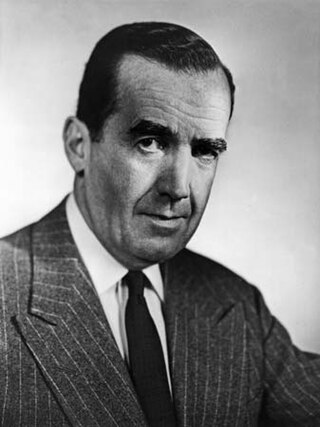
Edward Roscoe Murrow was an American broadcast journalist and war correspondent. He first gained prominence during World War II with a series of live radio broadcasts from Europe for the news division of CBS. During the war he recruited and worked closely with a team of war correspondents who came to be known as the Murrow Boys.
CBS News is the news division of the American television and radio service CBS. CBS News television programs include the CBS Evening News, CBS Mornings, news magazine programs CBS News Sunday Morning, 60 Minutes, and 48 Hours, and Sunday morning political affairs program Face the Nation. CBS News Radio produces hourly newscasts for hundreds of radio stations, and also oversees CBS News podcasts like The Takeout Podcast. CBS News also operates a 24-hour digital news network.

Robert Alan Edwards is an American broadcast journalist, a Peabody Award-winning member of the National Radio Hall of Fame. He hosted both of National Public Radio's flagship news programs, the afternoon All Things Considered, and Morning Edition, where he was the first and longest serving host in the latter program's history. Starting in 2004, Edwards then was the host of The Bob Edwards Show on Sirius XM Radio and Bob Edwards Weekend distributed by Public Radio International to more than 150 public radio stations. Those programs ended in September 2015. Edwards currently hosts a podcast for AARP.
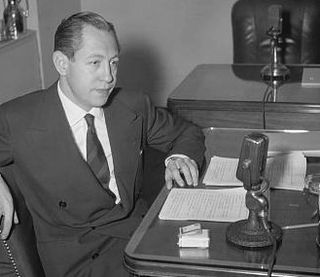
William Samuel Paley was an American businessman, primarily involved in the media, and best known as the chief executive who built the Columbia Broadcasting System (CBS) from a small radio network into one of the foremost radio and television network operations in the United States. He was awarded the Carlos Manuel de Cespedes National Order of Merit by the Cuban government in recognition of his efforts to foster greater understanding between the peoples of Cuba and the United States of America.

A terrestrial network is a group of radio stations, television stations, or other electronic media outlets, that form an agreement to air, or broadcast, content from a centralized source. For example, ABCTooltip American Broadcasting Company (U.S.), CBC/Radio-CanadaTooltip Canadian Broadcasting Corporation (Canada), the BBCTooltip British Broadcasting Corporation (UK), the ABCTooltip Australian Broadcasting Corporation (Australia), ARDTooltip ARD (broadcaster) (Germany), KBSTooltip Korean Broadcasting System, and NHK (Japan) are TV networks that provide programming for local terrestrial television station affiliates to air using signals that can be picked up by the home television sets of local viewers. Networks generally, but not always, operate on a national scale; that is, they cover an entire country.

Arnold Eric Sevareid was an American author and CBS news journalist from 1939 to 1977. He was one of a group of elite war correspondents who were hired by CBS newsman Edward R. Murrow and nicknamed "Murrow's Boys." Sevareid was the first to report the Fall of Paris in 1940, when the city was captured by German forces during World War II.
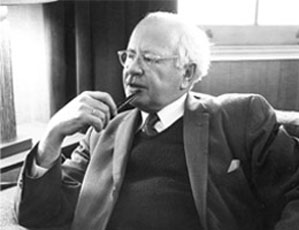
William Lawrence Shirer was an American journalist and war correspondent. He wrote The Rise and Fall of the Third Reich, a history of Nazi Germany that has been read by many and cited in scholarly works for more than 50 years. Originally a foreign correspondent for the Chicago Tribune and the International News Service, Shirer was the first reporter hired by Edward R. Murrow for what became a CBS radio team of journalists known as "Murrow's Boys". He became known for his broadcasts from Berlin, from the rise of the Nazi dictatorship through the first year of World War II (1939–1940). Along with Murrow, he organized the first broadcast world news roundup, a format still followed by news broadcasts.
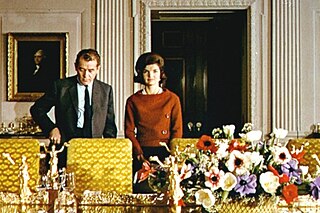
Charles Collingwood was an American journalist and war correspondent. He was an early member of Edward R. Murrow's group of foreign correspondents that was known as the "Murrow Boys". During World War II, he covered Europe and North Africa for CBS News. Collingwood was also among the early ranks of television journalists who included Walter Cronkite, Eric Sevareid, and Murrow himself.

Fred W. Friendly was a president of CBS News and the creator, along with Edward R. Murrow, of the documentary television program See It Now. He originated the concept of public-access television cable TV channels.

Robert Trout was an American broadcast news reporter who worked on radio before and during World War II for CBS News. He was regarded by some as the "Iron Man of Radio" for his ability to ad lib while on the air, as well as for his stamina, composure, and elocution.
The Bob Edwards Show was an American radio program broadcast from 2004 to 2014 by Sirius XM Satellite Radio every weekday morning at 8 a.m. Eastern, with repeats at 8 a.m. Central, 7 a.m. Pacific, 6 p.m. Mountain, and the next day at 7 a.m. Eastern. The program was heard on the Sirius XM Public Radio station at XM channel 121 and Sirius channel 205, and was also available 24/7 on XM Radio Online and Sirius Internet Radio.

The Murrow Boys, or Murrow's Boys, were the CBS radio broadcast journalists most closely associated with Edward R. Murrow during his time at the network, most notably in the years before and during World War II.
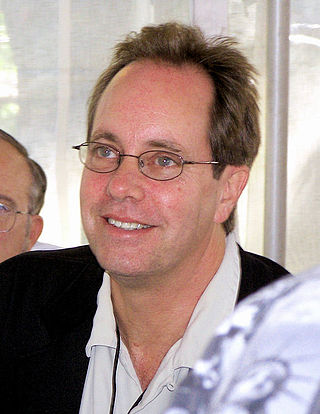
Jay Allison is an American independent public radio producer and broadcast journalist. His work has been featured on radio programs such as This American Life, as well as National Public Radio's All Things Considered, and Morning Edition. Allison is the executive director of Atlantic Public Media, which produced and administers Transom.org and the Public Radio Exchange PRX, and is the "Curator" and co-producer, with Dan Gediman, of This I Believe. He is also the "Curator" of the radio program, Heart of the Land.
The CBS World News Roundup is the longest-running network radio newscast in the United States. It airs weekday mornings and evenings on the CBS Radio Network.

Paul Welrose White was an American journalist and news director who founded the Columbia Broadcasting System's news division in 1933 and directed it for 13 years. His leadership spanned World War II and earned a 1945 Peabody Award for CBS Radio. After his departure from CBS in 1946 he wrote a textbook on broadcast journalism, News on the Air (1947). Since 1956 the Radio Television Digital News Association has presented the Paul White Award for lifetime achievement as its highest honor.

Mike Pesca is an American radio journalist and podcaster based in New York City. He is the host of the daily podcast, The Gist, and the editor of Upon Further Review: The Greatest What-Ifs in Sports History.
Dan Gediman is an American radio producer and performing songwriter. He is the executive producer of the public radio series This I Believe and co-editor, with Jay Allison, of the books This I Believe and This I Believe II: The Personal Philosophies of Remarkable Men and Women. He is also the co-editor, with John Gregory and Mary Jo Gediman, of the books This I Believe: On Love, This I Believe: On Fatherhood, This I Believe: On Motherhood, and This I Believe: Life Lessons, as well as Edward R. Murrow's This I Believe, This I Believe: Kentucky, and This I Believe: Philadelphia. He has also edited a new edition of Will Thomas's memoir The Seeking.

Guy Raz is widely considered to be one of the pioneers of podcasting. He’s been instrumental in creating some of the most iconic podcasts in the world including How I Built This, the kids science podcast Wow in the World, and TED Radio Hour. Guy is also the force behind the celebrity interview podcast The Great Creators and the business podcast Wisdom from the Top. The New York Times has described him as “one of the most popular podcasters in history.” Collectively, his shows reach 19 million listeners a month.
CBS Broadcasting, Inc. is an American English-language commercial broadcast television and radio network owned by Paramount Global through the CBS Entertainment Group. Along with ABC and NBC, CBS is one of the traditional "Big Three" American television networks.

Murrow is a 1986 biographical drama television film directed by Jack Gold, written by Ernest Kinoy, and originally broadcast by HBO. Daniel J. Travanti played the title role of American broadcast journalist Edward R. Murrow, and Robert Vaughn co-starred in the supporting role of Franklin D. Roosevelt. The cast also featured Dabney Coleman as CBS President William Paley.